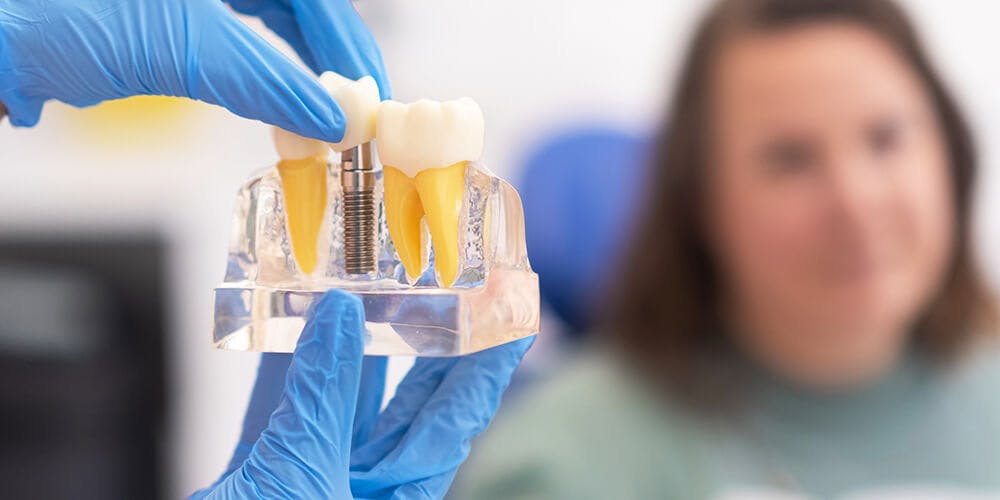Posted by Dr. Taner Cakmak on Mon, 22 Jan 2024
Kanata South Dental - Dentist Kanata

Taking proper care of dental implants is essential to ensure their long-term success and maintain overall oral health. Here are some guidelines for dental implant care:
- Follow Post-Operative Instructions:
- After the implant surgery, follow your dentist's post-operative instructions carefully. This may include guidelines on diet, medication, and oral hygiene practices.
- Maintain Good Oral Hygiene:
- Brush your teeth at least twice a day using a soft-bristle toothbrush. Use a low-abrasive toothpaste to avoid scratching the implant surface.
- Floss daily to clean between the teeth and around the implant. Water flossers or interdental brushes can also be effective.
- Regular Dental Check-ups:
- Schedule regular dental check-ups and cleanings. Your dentist will monitor the condition of your implants and provide professional cleaning to remove any plaque or tartar buildup.
- Avoid Harmful Habits:
- Avoid chewing on hard objects, such as ice or pens, as this can damage the implant or surrounding structures.
- If you have a teeth-grinding habit (bruxism), discuss this with your dentist, as a night guard may be recommended to protect the implants.
- Watch Your Diet:
- Be mindful of your diet, especially in the initial healing period. Avoid very hot or cold foods, and stick to a soft diet if recommended by your dentist.
- Quit Smoking:
- Smoking can impair the healing process and increase the risk of implant failure. If you smoke, consider quitting or at least cutting back significantly.
- Manage Medical Conditions:
- If you have medical conditions such as diabetes, follow your physician's recommendations to manage them effectively, as they can impact the success of dental implants.
- Stay Hydrated:
- Drink plenty of water to maintain overall oral and general health.
- Be Mindful of Signs of Complications:
- Keep an eye out for any signs of complications, such as persistent pain, swelling, or unusual sensations around the implant. If you notice anything unusual, contact your dentist promptly.
- Update Your Dentist:
- Keep your dentist informed about any changes in your health or medications, as they may affect your oral health and the success of dental implants.
Remember that proper care and maintenance, along with regular dental check-ups, are crucial for the success and longevity of dental implants. If you have any concerns or questions about your dental implant care, don't hesitate to consult with your dentist.
WHAT CAN I EAT AFTER DENTAL IMPLANT SURGERY
After dental implant surgery, it's crucial to follow your dentist's or oral surgeon's postoperative instructions, which may include dietary guidelines to promote healing and minimize discomfort. Here are general recommendations on what to eat after dental implant surgery:
- Soft Foods:
- Stick to a diet of soft, non-chewy foods during the initial days or weeks after surgery. This helps prevent irritation to the surgical site and reduces the risk of damaging the implants. Examples include:
- Yogurt
- Pudding
- Applesauce
- Smoothies
- Mashed potatoes
- Soup (avoid hot temperatures)
- Oatmeal or porridge
- Stick to a diet of soft, non-chewy foods during the initial days or weeks after surgery. This helps prevent irritation to the surgical site and reduces the risk of damaging the implants. Examples include:
- Protein Sources:
- Ensure that you get enough protein to support the healing process. Soft protein sources include:
- Eggs (scrambled or soft-boiled)
- Cottage cheese
- Soft fish (avoid bones)
- Ground or finely minced meat
- Ensure that you get enough protein to support the healing process. Soft protein sources include:
- Dairy Products:
- Dairy products are often a good choice, as they are soft and provide essential nutrients for healing:
- Milk
- Soft cheeses
- Yogurt
- Dairy products are often a good choice, as they are soft and provide essential nutrients for healing:
- Avoid Hard and Crunchy Foods:
- Steer clear of hard, crunchy, or sticky foods that can exert pressure on the surgical site and may cause irritation or damage. This includes:
- Nuts and seeds
- Raw vegetables
- Tough meats
- Crunchy snacks
- Steer clear of hard, crunchy, or sticky foods that can exert pressure on the surgical site and may cause irritation or damage. This includes:
- Cold or Lukewarm Foods:
- Foods and beverages that are either cold or at lukewarm temperatures can help soothe any swelling or discomfort. Avoid hot or spicy foods, as they may exacerbate irritation.
- Hydration:
- Drink plenty of water to stay hydrated, but avoid using straws during the initial healing period. Sipping from a cup is usually a safer option to prevent unnecessary pressure on the surgical site.
- Gradual Transition:
- As you progress through the recovery process and your dentist gives the green light, you can gradually reintroduce more solid foods into your diet. Be sure to follow any specific dietary recommendations provided by your dental professional.
- Vitamins and Supplements:
- If your dentist recommends it, consider taking any prescribed or recommended vitamins or supplements to support overall healing.
CONCLUSION:
Always follow the specific guidelines provided by your dentist or oral surgeon. If you have concerns or experience any unexpected issues with your diet or recovery, consult with your dental professional for guidance. Proper nutrition and adherence to postoperative instructions are essential for successful healing and the long-term success of your dental implants.
Dentist Kanata
We will gladly answer any questions you may have.
Ask QuestionsKanata South Dental offers the ability to request your dentist appointments online. Schedule an appointment now!
Book OnlineBy filling out the New Patient Forms ahead of time you will save significant time on your visit.
New Patient FormsLatest News
Key Benefits of Dental Cleaning
Fri, 9 Jan 2026Key Benefits of Dental Cleaning (And What Happens If You Skip Them) Regular dental cleanings play an important role in keeping yo...
Continue Reading